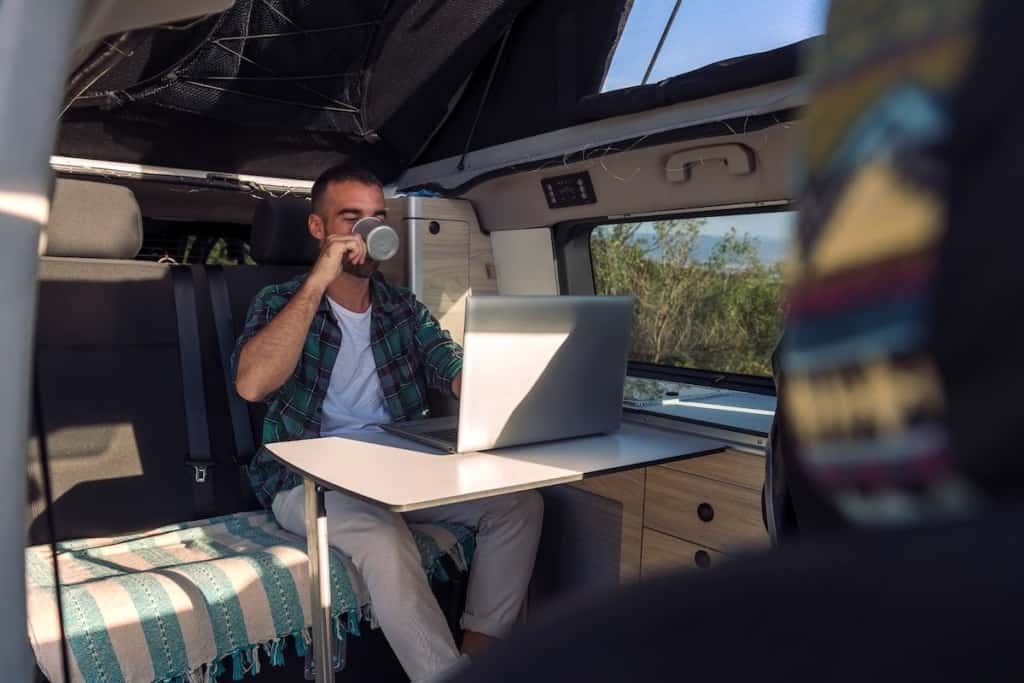Does a digital nomad lifestyle appeal to you but the thought of dealing with self-employed / freelancer taxes stress you out? Working on the road is so rewarding but still comes with its drawbacks. Tax laws for freelancers can be complex and at the end of the day, you just want to know what’s going to stay in your bank account!
I made the transition from full-time desk life to traveling freelancer at the end of 2019 and I’ve learned so much about digital nomad taxes. But as laws continue to change, I never stop seeking out tax advice.
That’s why I’m excited to share this Q&A I had with Heather, owner of Tax Queen, who specializes in helping digital nomads understand, process, and file taxes.
Side note: In this talk, Heather and I exclusively hit on tax laws and tax filing specific to our ‘ol home country of the USA. If you are a traveling US citizen who does freelance or self-employed work, this talk is for you. Take it away, Heather!
Hey! I’m Heather, the owner of Tax Queen, a tax firm supporting mobile entrepreneurs and digital nomads. As a federally-licensed Enrolled Agent, I support my clients year-round with tax preparation, tax planning, and bookkeeping. I’m a digital nomad myself so I get the lifestyle and I run a business. After traveling for over 5 years full-time in a 5th wheel, my husband and I now split time between a home base in Colorado and travel in both North America and overseas.

I’m here to answer some common questions about vanlife, travel, and running a business. Let’s dive right in.
1. This is my first year being a freelancer. What should I know about filing taxes?
Being a freelancer means you own a business. Most likely that business income and expenses will get reported as part of your Form 1040 on a Schedule C. You’ll need to track your income and expenses throughout the year so you’ll be ready to file and won’t need to spend hours at tax time gathering numbers.
It also means you may have to pay self-employment taxes in addition to income taxes and need to make quarterly estimated tax payments. The IRS has a pay-as-you-earn system so it’s important to keep up your tax payments throughout the year to avoid an underpayment penalty at filing time. Wondering what quarterly taxes are? I’ve got you covered in the next question.
2. What are quarterly taxes and do I have to pay them?
Quarterly taxes are simply a way for taxpayers to pay into the tax system throughout the year to keep up with their tax obligation. If you don’t have a “regular” W2 job where federal taxes and state taxes are being withheld and submitted on your behalf by your employer, then you are responsible for submitting all the payments.
The quarterly filing deadlines are April 15, June 15, September 15, and January 15. Making estimated payments includes any income tax obligation as well as self-employment taxes (Social Security taxes, and Medicare) and also, any state taxes if they apply to you. In order to avoid an underpayment penalty, you need to pay 100% of the prior year’s tax liability or 90% of the current year’s liability or owe less than $1000 at tax time.
3. How should I file if I earned income in multiple states?
You’ll file as usual with your domicile address on your Form 1040 but you may need to add the different state filings as a non-resident. It all depends on the total income earned and how much time you spent in each state.
Generally speaking, if you don’t earn above a threshold (each state is different on what that threshold is), then you don’t need to file in that state. However, if you physically worked in a state and received a W-2 for that work, then you’ll need to file in that state as a non-resident to either claim a refund or pay any additional tax bills you might owe. Different states have different tax rates, as well.
Here’s a great resource from the IRS that breaks down each state’s local tax requirements.
4. I sell items on Etsy, my own website, and at craft shows across the US. How do I pay taxes on those?

There are several things to take into consideration here. You may need to collect sales tax, especially for in-person sales. As far as income taxes, it most likely will all fall to wherever your business is registered and you are domiciled. Your business would report all this income on a Schedule C as part of your 1040.
However, state tax obligations can come if you sell in person and hit state minimums. It all depends on the amount of income earned in a specific state and the amount of time spent in each state.
5. Where do I file my taxes?
The first question to answer there, is: in what state are you a tax resident? Taxes are filed according to your domicile or resident address for the most part. You can electronically file through a do-it-yourself system, using a tax professional like myself, or paper mail a return. E-filing will be the quicker option as far as processing your return. If you have state obligations, you’ll file both a federal (IRS) and state tax return.
6. I rarely have access to a printer or mailing materials. Can I file my taxes 100% online?

Absolutely. Many tax documents are delivered electronically so there’s no need to print anything. Just keep all those documents securely in a digital folder. I actually always recommend electronically filing since your US tax return will be processed quicker. If you work with a professional, make sure to check with them if electronic signatures and filing are part of their process. I know my firm is 100% virtual so everything is done electronically using a secure client portal.
7. I'm a YouTuber and/or affiliate blogger. Do I have to pay taxes on my earnings?
Most definitely! If you earn over $400 during a tax year as a self-employed individual, then you must report that income on your tax return. Editor’s note: that applies to all job types; affiliates, those with remote jobs and those with local gigs–what matters is your status as a self-employed individual; not necessarily the job type.
Affiliate income or YouTube ads count as income and more than likely you will get a 1099NEC for that income. It’s important to track the income AND expenses for all income. You will be allowed to take any expenses you have incurred for creating the income to help reduce your net profit and therefore, your taxable income.
8. When is it a good idea to create an LLC, versus just being self-employed?
The LLC stands for Limited Liability Company and it helps to separate you from your business. Think personal assets vs. business assets. Contrary to popular belief, there is no tax benefit to having an LLC. If you start an LLC, you are self-employed. A single-member LLC is a sole proprietorship for tax purposes while a multi-member LLC is by default a partnership. Sole proprietors file a Schedule C as part of their tax Form 1040 and partnership file Form 1065 (due March 15).
9. Can I write off my phone and internet bills as a remote worker?
It all depends if you’re self-employed or you are a W-2 income earner. A W-2 employee would not be able to deduct phone or internet expenses. However, a self-employed individual who needs and uses a phone and internet for the business would be able to take some of the costs as a business expense.
Depending on how much you are using your phone for business dictates how much you can deduct as a business expense. It can be 50% if you’re on the phone often or 10% if it’s not used much for business. You’d have to determine that for your unique tax situation.
10. What other items can I potentially write off as a digital nomad?
Being a digital nomad doesn’t allow you to take specific tax deductions. If you’re a business owner, then there are business expense deductions.
Hopefully, these answers gave you some clarity around taxes and vanlife. As a bonus, here are a couple of other pointers for vanlife.
You may qualify for the solar tax credit should you install a solar system on your van or RV.
I have also seen some digital nomads able to deduct things like a co-working space as office rent if they like to work outside their tiny home or want to meet other remote business owners.
Some notes on international tax laws
Lastly, if you’re traveling internationally at all, you may qualify for certain foreign tax credits including the foreign earned income exclusion (FEIE).
Editor’s note: Two ways to determine if you qualify for the foreign earned income exclusion are through the bona fide residence test or the physical presence test. The bona fide residence test has more to do with your job and economic standing, whereas the physical presence test is determined simply by whether or not you are an American that has been outside of the US for 330 days out of one calendar year, and within your foreign country of residence (officially making you a US expat).
You’ll also want to be aware of the foreign bank account report, which stipulates that you must file an FBAR if you have, “financial interest in or signature authority over foreign financial accounts” that exceeds over $10,000 at any point in a calendar year, according to fincen.gov.
It’s important to know a foreign country’s tax laws and to carry a digital nomad visa with you (if your country of residence requires one). You definitely don’t want to end up with double taxation on your income–expat taxes are no joke!
Summing It Up

Enough about taxes. Am I right? Let’s talk about the fun stuff like being off the grid in an amazing boondocking spot. We enjoy being in nature so boondocking is definitely our preferred method for overnights. But honestly, we don’t have a favorite spot. I think that’s one of the reasons we like to travel. We appreciate and enjoy our current spot and then move to the next one. We do enjoy a spot with a good view or good trails to explore.
We also love being parked near friends for some social time. We’ve enjoyed stays in the desert, in the mountains, on the beach, at a Harvest Host, and in the forest. They all have their ups and downs. But give us a spot with an amazing sunset and we’ll be happy.
Save on Pinterest


